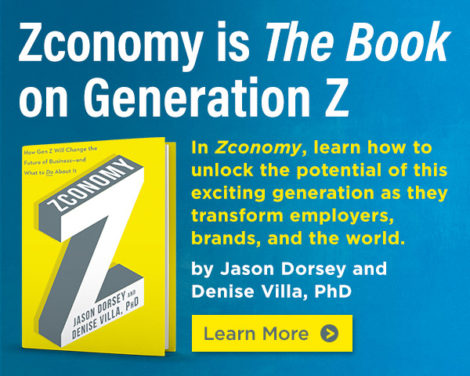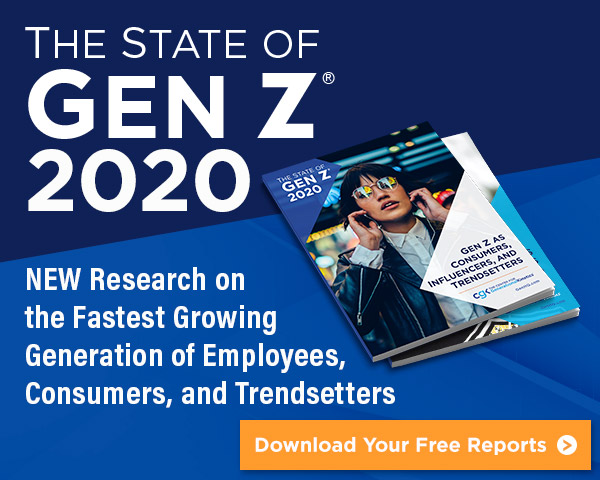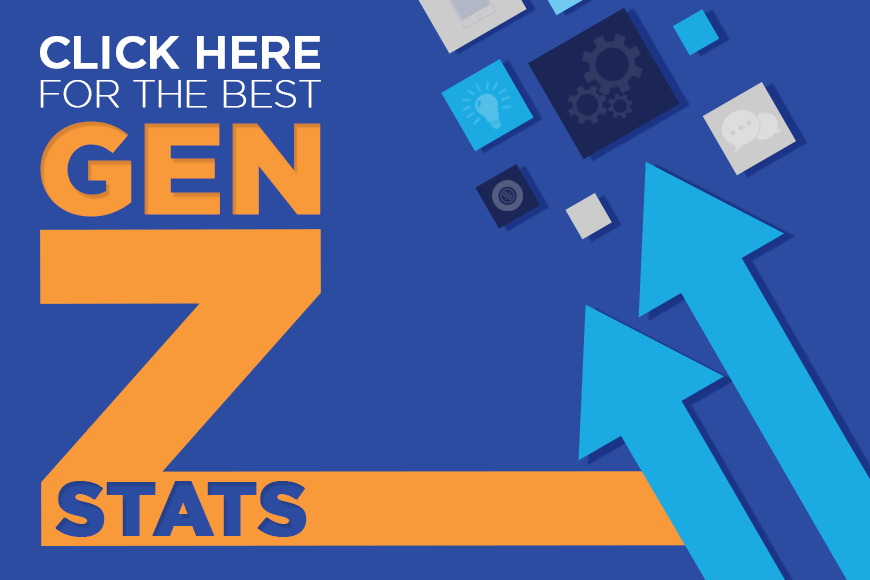ABOUT GEN Z
TOP 10 GEN Z QUESTIONS ANSWERED
Generation names often change as a generation comes of age and different characteristics or events come to define them. Often, what a generation is called early on is not what ends up sticking. For example, Generation Y morphed into Millennials, yet it’s the exact same generation. At The Center for Generational Kinetics, we call the generation after Millennials “Gen Z.” Other popular names for this fast-emerging generation are iGen and Centennials. This corresponds with our research defining them as cloud natives rather than digital natives; their world is “iEverything,” with a lowercase “i.” It will be interesting to see which name sticks as the generation emerges.
Get the latest Generation Z national research statistics and findings here.
As members of Gen Z are still largely kids and adolescents, many of their adult characteristics are yet to be vetted. Early indications are that they are increasingly self-aware, self-reliant, innovative and goal-oriented. They also appear to be more pragmatic than their Millennial predecessors, but we’ll have to wait and see if that plays out as they become employees, consumers, investors, and voters.
One key difference from Millennials: Most members of Gen Z don’t remember a time before social media. As a result, they tend to live much more of their entire lives—from interacting with friends and family to making major purchases—online and via their smartphones. This could have profound implications for everything from their relationships and how they learn to virtual reality training and problem-solving.
Gen Z are highly educated. It’s likely that a larger percentage of Gen Z will attend and graduate from college than any previous generation, including the Millennials. Gen Z is also adept at web-based research and often self-educates with online sources such as YouTube and Pinterest. They can learn complex things like how to upgrade your computer’s operating system the same way they can learn how to bake a vegan apple pie: one video at a time. They still possess general knowledge about traditional research methods, but they have come of age placing a priority on how fast you can find the right information rather than on whether or not you know the right information.
Gen Z wants to make a difference in the world. A large portion of the generation would prefer to have a job that makes a positive impact in some way, and a large portion of them volunteers. However, it’s unclear what impact school-based volunteer requirements are having on volunteer rates among iGen. What we do know is that an overwhelming majority of Gen Z are eco-conscious and concerned about humanity’s impact on the environment. We also know that they want to make a decent living with a stable employer. This practical aspect of financial prudence and wanting to help people could lead to longer-term differentiation from Millennials.
Gen Z are more diverse than Millennials. This is a big deal and is often overlooked. The tremendous diversity that Gen Z brings as employees, consumers and entrepreneurs will have a profound impact across generations and cultures. Brands and employers will have to learn how to see the world through the diverse eyes of Gen Z if they want to win their loyalty.
Yes! Gen Z is being raised differently than Millennials were, which should have some pronounced effects on their views and approach to being employees, customers, and citizens. Gen Z also has a different experience with technology than Millennials, which will affect every area of their life—from healthcare and dating to education and shopping. What is most interesting is that what worked for Millennials does not seem to be working as well with iGen, and this creates tremendous challenges and opportunities for organizations of all sizes and in all industries. The key differentiator between failure and success is getting accurate data about iGen early so leaders can adapt. The Center specializes in Gen Z research that provides marketers, executives, and employers with new strategies and research-based tactics to make the most of this emerging generation.
The differences and similarities between iGen and Millennials will be expressed over time, but the one thing we know is that we’ll have more data on Gen Z than on any generation in history!


